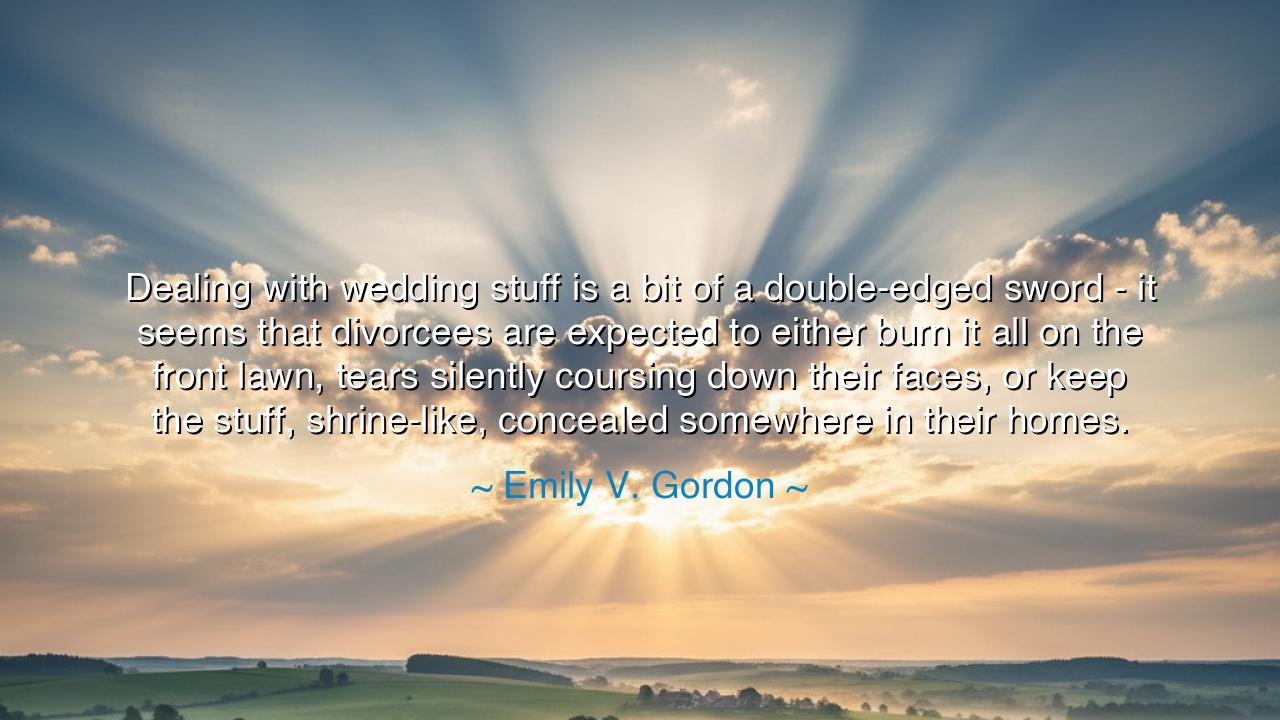
Dealing with wedding stuff is a bit of a double-edged sword - it
Dealing with wedding stuff is a bit of a double-edged sword - it seems that divorcees are expected to either burn it all on the front lawn, tears silently coursing down their faces, or keep the stuff, shrine-like, concealed somewhere in their homes.






The words of Emily V. Gordon—“Dealing with wedding stuff is a bit of a double-edged sword—it seems that divorcees are expected to either burn it all on the front lawn, tears silently coursing down their faces, or keep the stuff, shrine-like, concealed somewhere in their homes.”—speak of the strange burden that lingers after love has ended. In them lies the tension between memory and release, between honoring what once was and grieving what can never be again. The relics of a wedding—garments, photos, rings, invitations—become more than objects; they are symbols heavy with love, loss, and expectation.
The double-edged sword she names is the heart’s dilemma: to destroy or to preserve. To burn away the tokens is to proclaim freedom, to sever ties with pain. Yet it also risks erasing moments that once were holy. To keep them hidden, shrine-like, is to preserve what was once beautiful, but at the cost of imprisoning oneself within memory. Both choices cut, and thus the soul must decide which wound it can bear.
History gives us the tale of Henry VIII, who after the collapse of his marriages did not merely cast aside the tokens of love but sought to rewrite history itself, erasing the presence of his wives from portraits and records. Yet such erasures did not cleanse his soul, nor silence the memory of what had been. In contrast, others throughout history have kept relics of lost love in secret—letters, portraits, rings—both comforted and haunted by their presence. The burden Gordon describes is therefore universal, echoing across time.
Her words also reveal how society demands performance in grief. The world expects the divorcee either to rage and burn with visible drama or to sanctify the past in silence, as if there is no middle ground. Yet life is rarely so simple. Between fire and shrine lies a truer path: to acknowledge both the beauty and the sorrow, to let the objects remind us without enslaving us.
Therefore, O listener, heed this wisdom: the relics of love are powerful, but they need not rule you. A wedding dress, a photograph, a ring—these are but vessels of memory, not prisons of the soul. Whether you burn them, hide them, or place them openly as reminders of the life you have lived, let the choice be your own. For healing does not come from obeying the crowd’s script, but from walking the path of truth within your own heart.






AAdministratorAdministrator
Welcome, honored guests. Please leave a comment, we will respond soon